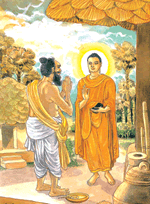Brahmin Unnabha's Questions to the Buddha (Unnabha Brahmana Sutra)
While he was residing at Savatthi the Brahman Unnaabha approached the Buddha and after exchanging greetings and polite conversation were over, he sat down to one side and said to the Buddha;
"There are these five sense faculties, good Gotama, of different spheres, different action, and they do not share in each other's sphere of action. Which five? The sense of sight, hearing, smelling, tasting and touching. As these five faculties are of different scope and range, and do not share in each other's sphere of action, what is their resort, and who profits from their combined activity?"
"There are, Brahman, these five sense-faculties... which do not share in each other's sphere of action. Mind is their resort, and it is the mind that profits from their combined activity" the Buddha explained.
It is evident from what the Brahmin Unnabha raised here, his desire to find answers to the questions he faced through his inquiry into such salient Dhamma he had learnt from the Vedanta tradition. Therefore we need to understand how this has been taught in Vedanta inorder to understand The Blessed One's responses better.
While the Vedanta teaching agrees with the Buddhas answer to the first question, that the Mind is the resort for the five sense-faculties and it is the mind that profits from their combined activity, it had following answers to the next two questions the Brahmin raised, i.e.
With regard to the question what Mind's resort is, they said it's the intellect, or ability to apply knowledge
With regard to the question what intellect's resort is, they said it is the Ataman, realising which they held as liberation or vimutti.
Isn't this what our understanding is too? for instance, when we see this clock in front of us, isn't it through our frame of mind that we recognise it as a clock? isn't it known thus based on a mental concept of ours? Therefore, aren't all things that we see, hear or sense are known by me ? "The dhamma taught in Veda is not to be simply dismissed. The Tathagata however, preached a Damma that transcended what was taught in the Veda.
As said, while the Buddha's answer to the first question agreed with the answer the Brahmin knew as taught in Vedanta; the Supreme One had different answers to the rest of the questions that the Brahmin raised, as evident in the dialogue between the two presented below,
"But, good Gotama, what is mind's resort?"
"Mind's resort, Brahman, is mindfulness."
"Then, good Gotama, what is the resort of mindfulness?"
"The resort of mindfulness, Brahman, is liberation."
"Then, good Gotama, what is the resort of liberation?"
"The resort of liberation is Nibbana."
"Then, good Gotama, what is the resort of Nibbana?"
"That question goes too far Brahman. No answer can encompass it. The aim of the holy life, Brahman, is immersion in Nibbana, it has Nibbana for its final end, Nibbana for its conclusion."
The Buddha urged worldlings to comprehend the mind but without resorting to concepts. Comprehending the mind (as it is), with mindfulness as a factor of enlightenment that awaken wise attention (yonisomanasikara) as he taught, makes way to liberation.
'Can you describe where the eye is apart from the biological eye that’s under our forehead that we know? 'When we poke our eye with a finger for instance, we do not undergo an experience of sight but a bodily sensation. The eye arises with the process of seeing, as a formation, as one that is conditioned and when known thus, we transcend the world (vimutti) which is the true liberation. It is only when the eye is known as it is truly, with clear comprehension, if not the notion of self (atma) continues to linger.' The Blessed one showed us the way to transcend the notion of self, (the notion of having one's own nature). His 'No Self' (Anatma) teaching shows us the way to be free from holding on to self, abandoning the notion 'I am'.
The Brahman Unnaabha was delighted with the words of the Blessed One and rejoiced in them. He rose, saluted the Blessed One and departed. Not long after his departure the Blessed One said to the monks:
"Monks, imagine a house or a pavilion with a peaked roof, with a window to the east. When the sun rises and its rays strike through the window, what do they rest on?"
"On the western wall, Lord."
"Just so, monks, the faith of the Brahman Unnaabha is settled on the Tathagata, rooted in him, established in him. It is strong, and cannot be uprooted by any recluse or Brahman, deva or Maara, or anyone else in the world.
"Monks, if the Brahman Unnaabha were to die now, there is no fetter to bind the Brahman Unnaabha and cause him to return to this world."
(Based on a Dhamma discourse by Ven. Alawwe Anomadassi Thero)
(Sutta Translation Reference : "Unnabho Brahmano Sutta: The Brahman Unnabha" (SN 48.42): suttacentral)




Comments
Post a Comment